

UN GLOBAL COMPACT COMMUNICATION ON PROGRESS
Fiscal Year 2024 ⁄ 2025
STATEMENT OF SUPPORT
We are living in a time of change, shaped by shifting global dynamics, new priorities, and an increasing demand for action. These developments are visible in our daily operations, from changing freight routes to evolving customer expectations. While some challenges are complex, we also see opportunities to create meaningful progress, both within our company and across the value chain.
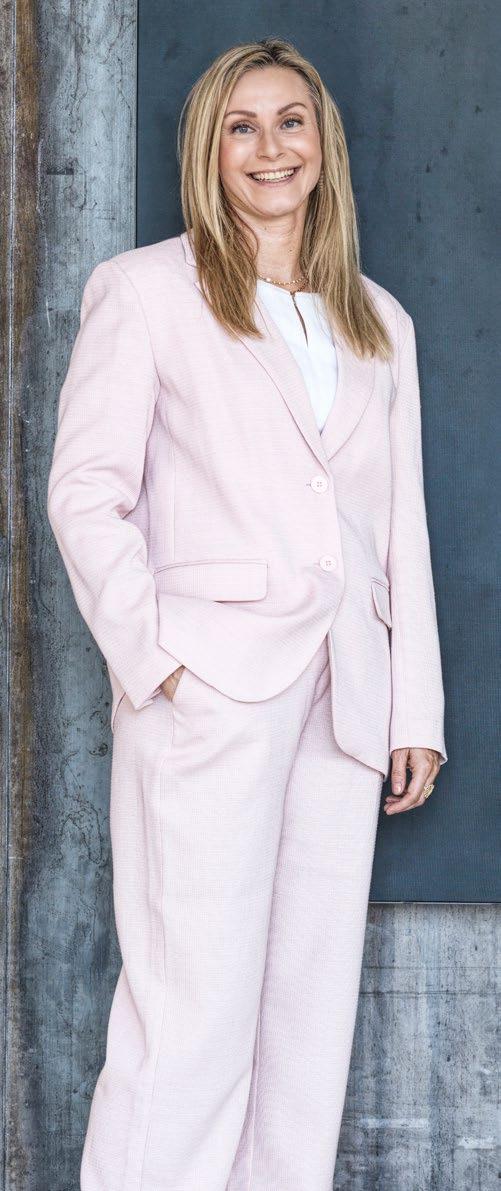
At GaveFabrikken, we remain committed to our responsibility for people, planet, and society. Climate change, biodiversity loss, and challenges related to human rights and working conditions continue to call for action. We believe that sustainability must remain a core value on our agenda, and we strive to contribute positively through our actions, behaviour, and partnerships.
With this in mind, we reaffirm our support for the UN Global Compact and its Ten Principles. Together with our stakeholders, we aim to reduce negative impacts and strengthen the positive outcomes of our work. Our new owners fully support this commitment, seeing sustainability as essential to long-term value creation and a key element of both our operations and our commercial strategy.
The strategy builds on GaveFabrikken´s strong track record of growth and performance, with ESG as a foundational pillar. We have established an ESG baseline, providing more transparency and clearer insight into where we need to improve and how we can make the most significant difference. Conversations about ESG and regulation are becoming increasingly central in our collaboration with both customers and suppliers. We expect this trend to continue, making long-term partnerships more important than ever.
We are also pleased with our ongoing initiatives. Our flagship concept, Gifts with Care, has once again exceeded expectations, with 11% more than anticipated, now representing 39% of the total assortment. We successfully recertified to the ISO 14001 environmental standard with no remarks. To further strengthen compliance, we engaged external specialists to assess and verify that overseas products meet the relevant EU standards and certifications.
No one can solve sustainability challenges alone. Progress is only possible through collective effort, starting with our own decisions and everyday actions. Our dedicated employees are at the heart of our journey, and we are deeply grateful for their commitment.
Our purpose is to deliver innovative gifts that bring joy and appreciation. In uncertain times, this becomes even more meaningful — caring for our employees and partners with gifts that truly matter and create lasting value for all.

Katrine Bjarkov Benthien CEO
ABOUT GAVEFABRIKKEN
For us, gifts serve as a strong symbol of human connection. That’s why our corporate gifting concepts go far beyond traditional merchandise.
Since GaveFabrikkens’ founding by Nikolai Kiim in 2008, the company has experienced 17 years of continual growth. In 2024, we embarked on an exciting new chapter as the Danish private equity fund Capidea acquired a majority stake in the company.
This partnership supports our continued development and helps future-proof GaveFabrikken while maintaining focus on ESG across all areas of the business. Today, we deliver approximately 1 million gifts annually across Denmark, Sweden, and Norway, establishing ourselves as a key player in the Nordic gift market. We specialise in offering a range of concepts for companies of all sizes, ensuring high flexibility and customer satisfaction. Last year, our turnover reached DKK 389 million.
GaveFabrikken has about 80 employees based at our Copenhagen headquarters, with departments in Oslo, Stockholm, and Aarhus. During peak season, we are supported by contractors.
Some of our gifts are developed in close cooperation with leading Danish and international brands and designers.

Our purchasing volume enables us to offer exclusive, high-quality gifts at competitive prices. Additionally, we offer our own private-label gifts.
GaveFabrikken received the Entrepreneur of the Year award in 2023, 2022, and 2020, as well as the Owner Manager of the Year award in 2019. Additionally, it was recognised as a Gazelle in 2020, 2019, 2018, and 2017. We are actively involved in supporting projects that benefit nature, society, and people. Some initiatives receive long-term support; others are selected annually to reflect current societal needs.

Our products are corporate gift items. They bring joy; however, we recognise that these gifts also have a social and environmental footprint. Therefore, we feel obliged to demonstrate our commitment to the UN Global Compact by supporting its principles, delivering results, and influencing our supply chain partners. We pursue this in two ways:
1. We reduce the negative impact of our operation and value chain.
2. We increase our positive impact by engaging with partners in our value chain and with external stakeholders in the communities we are part of.
Looking ahead, ESG will no longer be a separate aspect of our business, but rather a fundamental value embedded in our decision-making for commercial activities.
By integrating ESG more into the core of our commercial strategy, we not only meet stakeholders’ expectations but also future-proof the business in an evolving regulatory and consumer landscape. We believe that companies that balance purpose with performance will lead the next generation of corporate gifting.
STRATEGY MATERIALITY ASSESSMENT
We have identified the most critical environmental, social, and financial issues through a materiality assessment. We focused on the countries where our private-label products are manufactured and concentrated our efforts on the main categories of textiles, kitchen products, and electronics. The outcome of the analysis influences our decisions and activities in both the short and the long term.
Risk and opportunity issues
Carbon emissions
Pollution
Water
Human and workers' rights
Health and safety
Sustainable Products
Biodiversity & deforestation Governance
Resource use and circular economy
Corruption
Sustainability issues
Through the materiality assessment, we have identified several ESG issues that may present risks or opportunities for our business, impact our value chain, or affect people and the environment.
CO2 emissions from the extraction of raw materials, the production and transportation of gift items contribute to global warming.
Air pollution risk arises from the manufacturing and transportation of goods, where the use of fossil-based energy and emissions from production sites can contribute to air quality issues.
Many countries are vulnerable to water scarcity, and water can be a critical component in the production of certain products. Producing certain items can also involve risks related to the use of chemicals.
The production of items can lead to loss of biodiversity due to deforestation, habitat destruction, environmental contamination, and the overexploitation of natural resources.
A broad product portfolio, including wrapping and packaging, involves value chain risks associated with raw materials, manufacturing, and waste management.
Some factories are in countries where human rights violations and poor labour conditions pose risks.
GaveFabrikken’s focus on climate impact and reduction may affect its market position and business positively if addressed, or negatively if neglected, as customer expectations evolve.
Stricter environmental regulations may increase costs.
Collaborating with manufacturers and transitioning to lower-emission transportation can help reduce air pollution and positively impact brand reputation.
Stricter EU and global regulations on chemical use, water discharge, or water scarcity may increase compliance, costs and/or limit product availability. Offering products with certifications for low water and chemical impact (e.g. OEKO-TEX, GOTS) can enhance credibility and market appeal.
Our impact on biodiversity and deforestation can affect our company’s reputation and business positively if addressed through responsible sourcing, or negatively if gift production contributes to biodiversity loss or deforestation.
EU regulations on product design, material use, and Extended Producer Responsibility may impact both product assortment and cost structure. Material and design choices can positively influence customer trust and the company’s brand.
Violating human and labour rights at any point in the value chain can harm GaveFabrikken’s reputation and business.
Collaborating with trusted partners who uphold high standards can have a positive impact on workers across the value chain and strengthen our employee engagement.
Working conditions in the value chain can create unhealthy and/or unsafe mental and physical situations for workers.
In GaveFabrikken, we may be exposed to health and safety risks, especially during peak periods. This includes risk for seasonal workers.
Strong governance contributes to ethical business conduct, transparency, and accountability, which supports long-term trust and value creation. Poor governance can lead to misconduct and loss of legitimacy.
Serious accidents can damage GaveFabrikken’s reputation and business.
GaveFabrikken has the potential to positively influence conditions both in our operations and across the value chain, benefiting workers, employers, and society as a whole.
A lack of good governance makes the company vulnerable and exposes it to ethical breaches, legal risks, and reputational damage.
Effective management systems create clarity, trust, reduce risk, and support opportunities and results.
Meeting stakeholder expectations on sustainability can have a positive impact on business performance and market position.
We invested in 8 electric company cars.
We were recertified to ISO 14001.
We have implemented strategic supplier management (through a procurement policy and an assessment questionnaire).
We have increased the share of recycled content in the plastic used for wrapping and packaging shipped from our warehouse to customers. The material now contains 50% recycled plastic.
Paper-based packaging materials used for shipments from our warehouse to customers are FSC certified (FSC 70 or FSC mix).
We are shifting to green energy in DK.
We are setting higher standards for materials and design, and continuing our efforts to reduce, reuse, and recycle materials.
Implement procedures to reduce packaging mistakes and unnecessary transportation.
We are exploring opportunities to increase the recycled content in plastic packaging used for shipments from the warehouse to customers, with a target of 60%.
We will continue our collaboration with the ForestPlanet organisation.
We have increased collaboration with suppliers and producers in Asia that are BSCI compliant, hold similar certifications, or have documented policies and procedures.
We have conducted a workplace assessment (APV) and, as a result, have provided a first aid course and installed a defibrillator at the warehouse.
We have established third-party validation of suppliers’ certifications and labels, following EU standards and requirements.
We are continuing to increase the share of suppliers/manufacturers who have BSCI compliance and similar certifications, or other documented policies and procedures.
We are undergoing an external audit to verify our adherence to health and safety procedures and protocols.
We are implementing an Employee Engagement Survey.
Corruption has a profoundly negative impact on society.
GaveFabrikken delivers approximately one million gifts annually, which carries the risk of negatively impacting its ESG.
Establishing a culture of transparency, clear values, and well-defined principles is an effective approach to preventing corruption.
Increasing the share of products with a more sustainable profile can help reduce emissions and environmental impact, while supporting fundamental human and labour rights. This can have a positive effect on our communication, reputation, and sales.
We have implemented an anticorruption programme that includes a policy and a whistle-blower system and training.
We collaborate with suppliers and producers to enhance the transparency surrounding gift items’ sustainability profiles, minimise negative environmental impacts, and encourage gift recipients to consume and dispose of gifts responsibly.
We are making ESG the foundation of our commercial strategy.
The risks and opportunities associated with ESG are regularly on the board agenda.
We are enhancing internal communication and engaging our employees in initiatives and objectives.
We are continuing our focus on ensuring that suppliers sign up to our Supplier Code of Conduct.
We remain committed to upholding our anti-corruption programme.
We are increasing our focus on Gifts with Care by continuing to work with suppliers and producers to expand the range of responsibly sourced and produced gift items.
We are training our salespeople to enhance their knowledge of Gifts with Care.
We are enhancing the marketing and communication efforts in relation to Gifts with Care.
ENVIRONMENT
Principle 7: The company should support a precautionary approach to environmental challenges
Principle 8: The company should undertake initiatives to promote greater environmental responsibility
Principle 9: The company should encourage the development and diffusion of environmentally friendly technologies
With growing awareness of the environmental impact of gifts, we recognise our responsibility to reduce our footprint. The demand for more sustainable gift solutions is increasing, along with the need for transparent reporting and documentation. While the transition is ongoing, we are making steady progress and remain
committed to addressing environmental challenges and to continuing improvement.
A key milestone this year was our successful recertification to the ISO 14001 environmental management standard, achieved with no remarks.
OUR CONTRIBUTION TO
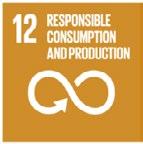
Completed in 2024/25
We have reduced scope 1 by 59.3%
We reached 39% in the category of Gifts with Care (target 35%).
We were recertified to ISO 14001.
Packaging from our warehouse is FSC certified (FSC 70 or FSC mix).
We have increased the share of recycled plastic used for wrapping and packing to 50%.
LED lighting is installed in most areas.
80% of the company cars are electric.
Targets for 2025/26
Scope 1 >42% reduced. Scope 2 significantly reduced –2030 target within reach.
42% of products are in the Gifts with Care concept.
Activities in 2025/26
Shift to green energy in Denmark.
Implement procedures to reduce packaging errors and unnecessary transportation.
Investigate if we can increase reused material in plastic packaging from the warehouse to 60%.
Produce catalogues via green electricity.

75% Scope 1 reduction this year
We have set a near-term target of at least a 42% reduction in Scopes 1 and 2 by 2030. Since last year, we have reduced Scope 1 emissions by approximately 75%. The reduction is primarily owing to changes in our car policy, with 80% of our company car fleet now transitioned from fossil fuels to electric vehicles. We will continue working towards a fully electric company car fleet. With this reduction, we have already surpassed the 2030 target of a 42% reduction in Scope 1 emissions. From the baseline, we have reduced Scope 1 by 59.3%.
Also, Scope 2 emissions have decreased this year following the phase-out of gas heating and the installation of heat pumps in Hedehusene. Although electricity use has increased as a result, the overall carbon intensity has been reduced owing to the lower emissions factor of electricity compared to natural gas.
Looking ahead to 2025-26, we expect a significant decrease in market-based Scope 2 emissions, as we will have transitioned to green energy across all locations in Denmark.
We have continued to improve the environmental profile of our packaging materials in the warehouse. All paper-based packaging is now FSC certified (FSC 70% or FSC mix), and plastic packaging contains 50% recycled content. Our next step is to increase the share of recycled plastic to at least 60%. We also remain focused on reusing cardboard for packaging, improving the sorting of plastic film, and ensuring proper waste separation at all locations.
Together with our partners, we will continue the dialogue to improve our footprint across the value chain.
Supplier standards and certifications
GaveFabrikken has an environmental policy. We prefer suppliers who can demonstrate recognised environmental certifications and who have set CO₂ reduction targets. All suppliers and partners are required to sign and adhere to our Environmental Policy.
Code of Conduct and Environmental Policy.
As part of our supplier assessment, we collect data on environmental performance, including certifications from recognised schemes such as ISO, FSC, Cradle to Cradle, and the EU Ecolabel. We also assess whether suppliers commit to the UN
Global Compact principles, have a formal environmental policy, or aim for CO₂ neutrality.
Our procurement management is based on clear policies, guiding principles, and structured questionnaires designed to facilitate supplier dialogue and informed decision-making. However, we recognise that collecting and validating documentation, particularly for items produced overseas, can be complex and resource-intensive. To address this, we plan to revisit and refine our approach in the coming year to establish a more efficient and practical process and set new targets.
Increase the concept of Gifts with Care
We continually aim to expand the concept of Gifts with Care, which we can only achieve in close cooperation with our value chain partners. Gifts with Care encompasses products with environmental and social criteria, such as the use of recycled materials, product durability, contributions to social causes, or relevant certifications (see page 12, Gifts with Care).
Continuing to expand the number of products within the concept is a challenging yet ambitious goal. We also depend on the active engagement of our suppliers and producers, including their ability to mitigate negative impacts and identify opportunities. A key challenge is striking a balance between innovation and sustainable development. Therefore, we maintain a close dialogue with key long-term partners and work actively with private-label producers.
In 2024, we exceeded our target of 35% for the Gifts with Care assortment, reaching 39%. For 2025, we aim to increase this share to 42%. To support this goal, we will raise customer awareness of Gifts with Care by strengthening our marketing efforts and investing in targeted training for our sales team.
OUR ENVIRONMENTAL COMMITMENT
GaveFabrikken A/S is committed to:
• complying with applicable laws and regulations
• setting targets and objectives to achieve continual improvement
• focusing on suppliers or products that reduce adverse environmental impact
SOCIAL
Principles for Human and Labour Rights
Principle 1: The company should support and respect the protection of internationally proclaimed human rights
Principle 2: The company should make sure it is not complicit in human rights abuse
Principle 3: The company should uphold the freedom of association and the effective recognition of the right to collective bargaining
At GaveFabrikken, we are committed to upholding our responsibility to respect the human rights and fundamental rights of workers, as outlined in the UN Guiding Principles on Business and Human Rights. We must respect all the principles and comply with the exact requirements outlined in our Supplier Code of Conduct.
OUR CONTRIBUTION TO
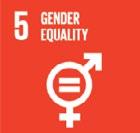
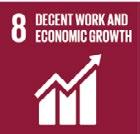
Completed in 2024/25
We engaged with suppliers on ESG expectations and performance.
We got to the level of sourcing 58.5% of our private-label products from BSCI-certified suppliers.
We have conducted a workplace assessment (APV).
We have conducted a first aid course and installed a defibrillator at the warehouse.
We had zero lost-time injuries.
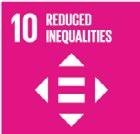
Targets for 2025/26
65% of private-label products are from suppliers with BSCI certification, similar certifications, or documented policies and procedures.
We have a baseline on employee engagement.
Zero occupational accidents.
Principle 4: The company should uphold the elimination of all forms of forced and compulsory labour
Principle 5: The company should uphold the effective abolition of child labour
Principle 6: The company should support the elimination of discrimination in respect to employment and occupation
We strive to promote a positive and inclusive work environment that respects all individuals. We want to create equal access to opportunities for all. We want a workplace where rights, pay, and potential are not defined by characteristics such as race, skin colour, or gender.
Activities in 2025/26
Identify and strengthen collaboration with suppliers who hold relevant certifications or have documented ESG policies and procedures.
Conduct an Employee Engagement Survey in 2026.
External health and safety audit.
Hire a full-time HR manager to increase focus on employees, culture, and the work environment, in terms of both physical and psychological safety.
Scope
We will look at suppliers of products and services, as well as private-label producers, in addition to our own operations.

Work environment
We strive to create a safe, healthy, and inclusive work environment where employees can grow and thrive.
Employees must be able to carry out their work under physically safe and healthy conditions. Therefore, we focus on preventing workplace accidents and injuries, ensuring compliance with regulations, and promoting best practices in occupational safety.
Equally important is psychological safety, mutual respect, and a culture of inclusion. We emphasise respectful behaviour and decency, while actively promoting diversity and inclusion.
All employees – and especially managers – share responsibility for maintaining a culture where everyone feels safe, valued, and supported.To strengthen our focus, we are hiring a dedicated HR Manager to lead initiatives that support our people and culture.
A health insurance plan covers all employees through our occupational pension scheme.
We aim for zero workplace accidents, and any form of abusive or inappropriate behaviour will result in disciplinary action.
Zero lost-time accidents
Over the past two years, we have prioritised health and safety through regular follow-up in management meetings, clear communication with employees, and an improved onboarding process for temporary warehouse staff. This effort has paid off. Unfortunately, we did experience one occupational accident this year; however, we are pleased to report that we have had zero lost-time accidents.
Suppliers with BSCI certifications
We are continually working to strengthen sustainability in our supply chain through a more systematic approach to procurement. In collaboration with procurement management, we have introduced a comprehensive procurement policy supported by clear principles and assessment tools. This approach helps us structure our dialogue and evaluation of partners, suppliers, and manufacturers.
We aim to increase the proportion of overseas suppliers and manufacturers certified under BSCI or equivalent social compliance schemes. In 2024, 58.5% of our products were sourced from suppliers certified by BSCI. To strengthen our commitment to responsible sourcing, we have set a target of 65% for 2025.
We recognise, however, that ensuring full compliance across the value chain remains a challenge, particularly when manufacturers engage sub-suppliers. Despite this complexity, we are committed to continual improvement. Building and maintaining long-term, trust-based relationships with manufacturers remains a central part of our approach. We will continue to engage with new and existing suppliers to identify, mitigate, and reduce risks related to ESG factors.
OUR SOCIAL COMMITMENT
GaveFabrikken A/S is committed to:
• complying with applicable laws and regulations
• setting targets and objectives to achieve continual improvement and responsible development
• focusing on suppliers that reduce adverse social impact
INCREASE THE CONCEPT OF GIFTS WITH CARE
Products in the Gifts with Care concept have been selected based on environmental and social criteria. For example, they may be made from surplus or recycled materials,

Since 1904, Georg Jensen has created timeless Scandinavian design featuring a unique combination of excellent craftsmanship, functionality and aesthetic shapes. Their vision is clear: to create sustainable design that can be passed down through generations. All Georg Jensen stainless steel products are made from at least 60% reused stainless steel that is 100% recyclable. The products also come in FSC or Cradle-to- Cradle certified packaging, as part of reducing their overall environmental footprint.
or designed for durability and high quality. They may also contribute to charitable causes or carry certifications such as FSC, OEKO-TEX, GOTS, or Fairtrade.

The Kay Bojesen brand was founded in 1932. His wooden animals are some of the most iconic Danish designs and are based on the philosophy that good design should be accessible to everyone.
The creative and playful world of animals is made from high-quality sustainable materials from FSC® certified plantations. FSC-certified wood comes from forests where no more trees are felled than the forests can reproduce. FSC is also a guarantee that flora and fauna are protected, and that the people working in the forest are trained and are given proper safety equipment and pay.
Rosendahl Design Group, which is now behind the Kay Bojsen brand, focuses on reducing material use, and most boxes are made of FSC® certified or recycled paper. They concentrate on reducing unnecessary packaging materials to reduce the overall footprint of their products.

Royal Copenhagen is strongly committed continuously improving its sustainability performance. They ensure that 90–100% of its landfill waste is recycled and reused across industries. Plaster becomes building material, porcelain turns into bricks or road base, plastic is repurposed into textiles, and glass is melted for reuse. Production is free from harmful chemicals, with 40% of electricity coming from solar power-reaching up to 97% during peak sunlight. Additionally, 99% of treated groundwater is reused, and no wastewater is discharged, as all production water is filtered and stored for future use.

SoundLiving SOLAR: SoundLiving combines cutting-edge audio technology with a strong commitment to reducing their environmental footprint. The brand’s flagship product, SoundLiving Solar, is a testament to this vision—premium headphones equipped with integrated solar cell technology that allows continuous charging through both ambient and natural light.
Rooted in modern Nordic design, SoundLiving delivers high- performance products with an emphasis on longlasting quality and conscious material choices. Each product is crafted using at least 46% recycled plastic, actively reducing plastic waste and supporting a circular economy. Additionally, all packaging is designed from recycled paper and more sustainable alternatives, minimizing unnecessary resource consumption across the value chain.
SoundLiving’s approach reflects a holistic ESG mindset, where innovation, aesthetics, and environmental responsibility go hand in hand.

Flora Danica designs elegant seasonal ornaments that inspire lasting memories and traditions across generations. Among its most iconic pieces are the gilded mistletoe and spruce branch—both discovered in the Danish countryside and faithfully recreated in aluminium, plated with 18-carat recycled gold.
Sustainability and environmental respect are central to every step of Flora Danica’s production. All gold used is 100% recycled and sourced in compliance with the standards set by the Responsible Jewellery Council, ensuring transparency, traceability, and social responsibility.
Packaging is sourced exclusively from Danish suppliers and produced in alignment with the UN Global Compact goals. Every gift box is FSC-certified, guaranteeing that the materials come from responsibly managed forests that protect biodiversity and uphold fair working conditions. With a deep respect for nature and craftsmanship, Flora Danica combines timeless design with a firm commitment to responsible sourcing and environmental care.


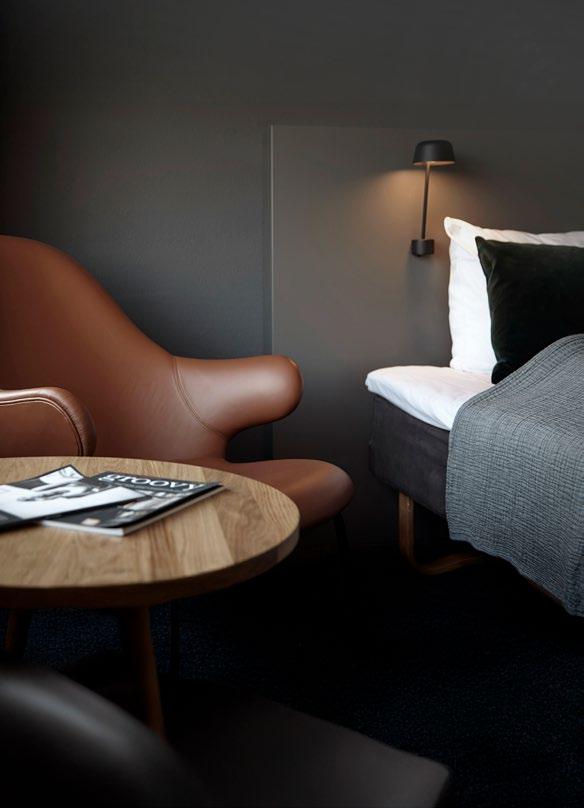
As sustainability expectations continue to grow in a rapidly changing world, Comwell Hotels recognises its responsibility not only to adapt but also to lead the way — especially as a key player in the Danish hospitality sector.
In 2023, Comwell Hotels committed to the Science Based Targets initiative (SBTi) as an essential part of their plan to reduce their overall carbon footprint and achieve carbon neutrality in their own operations by 2030 and in the entire value chain by 2040. Comwell believes that an ambitious plan is a breeding ground for creative ideas and innovative solutions that turn into concrete and practical actions.
Comwell has been named Denmark's most sustainable hotel chain for the seventh year in a row at the Sustainable Brand Index Award, Europe's largest brand index ranking brands according to sustainability.
They invest in employee well-being, development, and education as a foundation for advancing its ESG agenda. Through initiatives such as the successful Trainee Academy and sustainability programs Green Chef and Green Hostmanship, the company ensures strong internal competencies that support the ESG agenda.
Omhu is part of Uno Image, a company committed to delivering high-quality products with care for both people and planet. The brand’s ESG agenda is deeply rooted in the ambition to combine thoughtful design with environmental and social responsibility. This means actively seeking and implementing innovative, meaningful technologies and investing time and resources in developing, more sustainable solutions across the value chain.
A cornerstone of Omhu’s sustainability efforts lies in the careful selection of materials. All textiles used in production are certified with OEKO-TEX, GOTS, Fairtrade, the Nordic Swan Ecolabel, and SA8000. These certifications reflect a strong commitment to responsible sourcing, reduced environmental impact, and ethical labour conditions from field to finished product.
By prioritising transparency, circularity, and certified quality, Omhu ensures that each product contributes not only to customer satisfaction but also to long-term, positive impact for workers, communities, and the environment.


ISO14001 RECERTIFIED IN 2025
Environmental protection and compliance are paramount to the future. At GaveFabrikken, we believe that compliance is much easier to achieve when working within a clear and structured framework. In 2021, we implemented the ISO 14001 environmental management system and in 2025, we successfully recertified to ISO 1400 with no remarks.
In our ESG work, we aim to ensure alignment with our commitment to the UN Global Compact, our policies, and ISO 14001 standards. These elements form the foundation for our overall goals and initiatives. We develop internal capabilities and engage external experts as needed. At the same time, we continually assess

whether additional resources are required to strengthen our environmental efforts and comply with relevant requirements. We also ensure that employees are regularly informed and engaged so that they understand our strategy, participate in initiatives, and work towards our shared objectives.
The Environmental policy applies to our management, employees, contract workers, suppliers, and producers of gift items. We ask all parties to minimise the use of energy, materials, and water to prevent excessive use of chemicals and ensure efficient recycling and disposal of waste. By actively engaging in environmental issues, we aim to minimise our overall environmental impact.
EFFICIENT AND SCALABLE LOGISTICS
Our operations are supported by our own 5,500 m² warehouse in Hedehusene, as well as 30,000 m² of external facilities. With a packing capacity of up to 30,000 gifts per day, we are equipped to handle large volumes efficiently.
We place a strong emphasis on environmental responsibility, both in terms of packaging and transportation. Deliveries within Denmark, the EU, and other international destinations are handled by DSV, GLS, and Danske Fragtmænd, and we are in ongoing discussions with carriers who are expanding the use of electric vehicles in their deliveries.
Thanks to our high purchasing volumes, most goods are shipped in full containers directly from the suppliers’ factories. This approach not only ensures shorter transport distances from production to the final destination but also minimizes unnecessary transportation across the value chain.

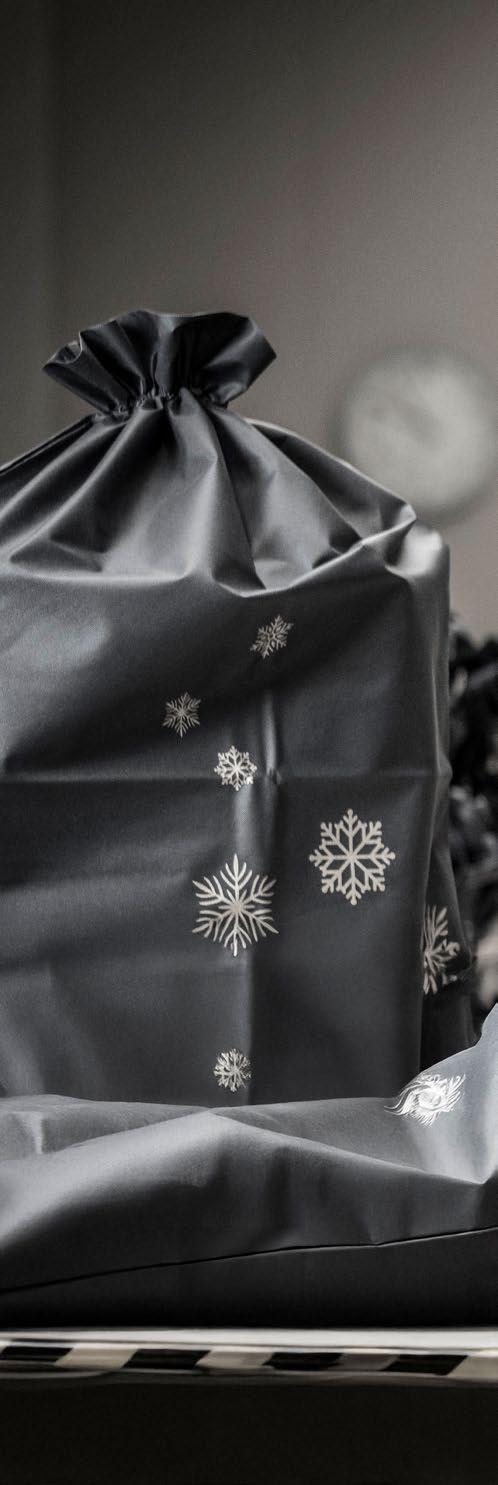
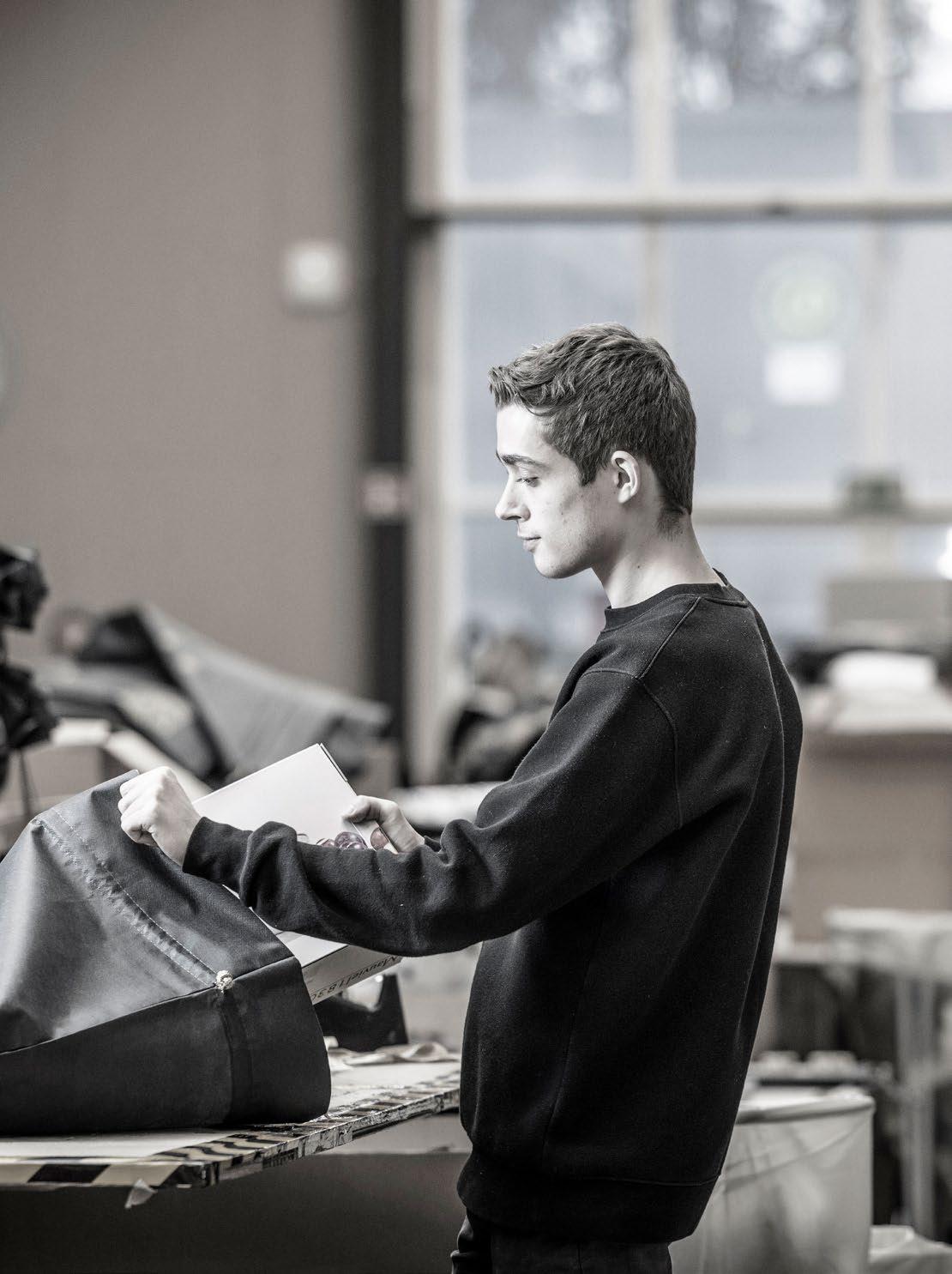
GOVERNANCE
Principle for Anti-Corruption
Principle 10: The company should work against corruption in all its forms, including extortion and bribery.
We strive to foster a culture of trust, openness, and accountability throughout the company. Unethical behaviour and breaches must be identified and addressed appropriately. At GaveFabrikken, we are committed to conducting business in an ethically responsible manner, based on transparency,
clear principles, and strong governance structures. Who we are and how we act is essential to earning and maintaining the trust of our customers, suppliers, business partners, and the society of which we are part.
OUR CONTRIBUTION TO
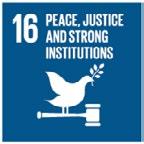
Completed in 2024/25
We implemented an anti-corruption programme.
We trained managers and relevant employees in anti-corruption.
We began collaborating with third-party experts, to ensure validation of documentation from suppliers.
Targets for 2025/26
We have zero corruption incidents.
Activities in 2025/26
Continue to raise awareness and support the culture of integrity, transparency, and ethical business behaviour.
Hire external experts to verify documentation from the Far East.
Maintain ESG as a strategic priority at the board level.
Anti-corruption and business ethics
Over the past few years, we have developed and implemented an internal anti-corruption programme to uphold ethical standards and promote transparent and trustworthy business practices. The programme is anchored in a policy and supported by systems and procedures that enable employees to act with integrity and ensure compliance. These mechanisms are designed to prevent informal or undocumented exchanges and to reduce the risk of corruption throughout our operations.
To strengthen awareness and capabilities, we conducted targeted training sessions for managers as well as sales and procurement staff in 2025, with the support of external experts. The training focused on identifying and addressing risks and irregularities in daily operations.
GaveFabrikken has a whistleblower mechanism that allows for reporting various types of misconduct and issues, including but not limited to reporting corruption and conducting internal investigations. This mechanism provides a safe and confidential way to raise concerns anonymously. It can also provide valuable insights into potential ethical violations, which can help us improve policies and procedures as necessary. We believe that this creates a solid foundation to ensure that all our business activities are conducted ethically, transparently, and responsibly.
We will continue to raise awareness and to support a culture of integrity, transparency, and ethical business behaviour.

GaveFabrikken’s anti-corruption goal is zero incidents. We had none in the reporting year 2024/25.
Compliance and documentation
In recent years, as our business has expanded and regulations have become more complex, we have recognised the need for expert support to verify that all relevant documentation complies with Danish and EU legislation. This is particularly relevant when sourcing products from overseas suppliers. We are committed to full compliance with applicable EU requirements relating to health, safety, and environmental protection.
To ensure this, we work closely with accredited third-party verifiers, and we maintain full traceability and documentation throughout our supply chain. Maintaining long-term, trustbased relationships with producers enables us to secure reliable information and consistently uphold compliance standards over time.
All suppliers and partners are required to sign and adhere to GaveFabrikken’s Supplier Code of Conduct. The Code of Conduct ensure that our suppliers operate in accordance with local laws and internationally recognised minimum standards for human rights, labour rights, health and safety, and environmental responsibility. By adhering to these standards, we strive to foster responsible and sustainable growth in close collaboration with our suppliers and partners.
ROLES AND RESPONSIBILITIES
The management team consists of 10 members and represents the company across the Nordic markets. They are responsible for integrating sustainability into the strategy and operations, ensuring ESG compliance, and promoting responsible business conduct.
The Board of directors
The Board approves the strategy, goals and the annual reporting, including financial and ESG reporting. They are responsible for continuously monitoring risks, impacts, and opportunities and are informed about ESG performance at board meetings. They oversee that the company complies with policies and is managed according to ethical principles.
The CEO and Management team
Our CEO is responsible for ensuring that sustainability is integrated into the company's strategy, including ESG initiatives, overseeing the company's progress, and reporting on this matter. This includes incorporating sustainability into the company's core business, establishing objectives, and ensuring that sustainability principles are implemented at all levels of the organisation. The management team is responsible for approving and ensuring compliance with ESG policies, as well as promoting ethical corporate conduct and adherence to relevant regulations.
ESG Steering Committee
We have a cross-functional, sustainable Steering Committee comprising the CEO, Head of Sales, Procurement Manager Europe, Procurement Manager International, Head of Warehouse, Head of Communication and Marketing and

The Finance Manager who also serves as the ESG Manager. The Steering Committee is responsible for ensuring that business- strategic ESG initiatives are consistently anchored across the company, including developing and implementing framework tools, as well as policies, initiatives, and communication strategies The ESG Manager is facilitating the meetings.
The ESG Manager
The ESG Manager is responsible for collecting and reporting data. The ESG Manager is also responsible for establishing procedures, controls, and follow-up measures to ensure compliance with relevant regulations. Additionally, the manager ensures that GaveFabrikken aligns with the principles of the Global Compact and relevant regulations, consulting external advisors as necessary.
Policies and guidelines in GaveFabrikken
• Code of Conduct, including policy for Anti-Corruption and Health and Safety
• Environment Policy
• Procurement Policy
• Whistleblower mechanism
• Employee Handbook
OUR ETHICAL COMMITMENT
GaveFabrikken A/S is committed to:
• complying with applicable laws and regulations
• fostering a culture of anti-corruption
• acting with integrity and promoting ethical conduct throughout the organisation
GaveFabrikken´s Management Team is responsible for integrating sustainability into the strategy and operations, ensuring ESG compliance, and promoting responsible business conduct.
Marie-Louise Heidelberg Head of Communication and Marketing
Sidsel Lyng Randby Head of Procurement, International
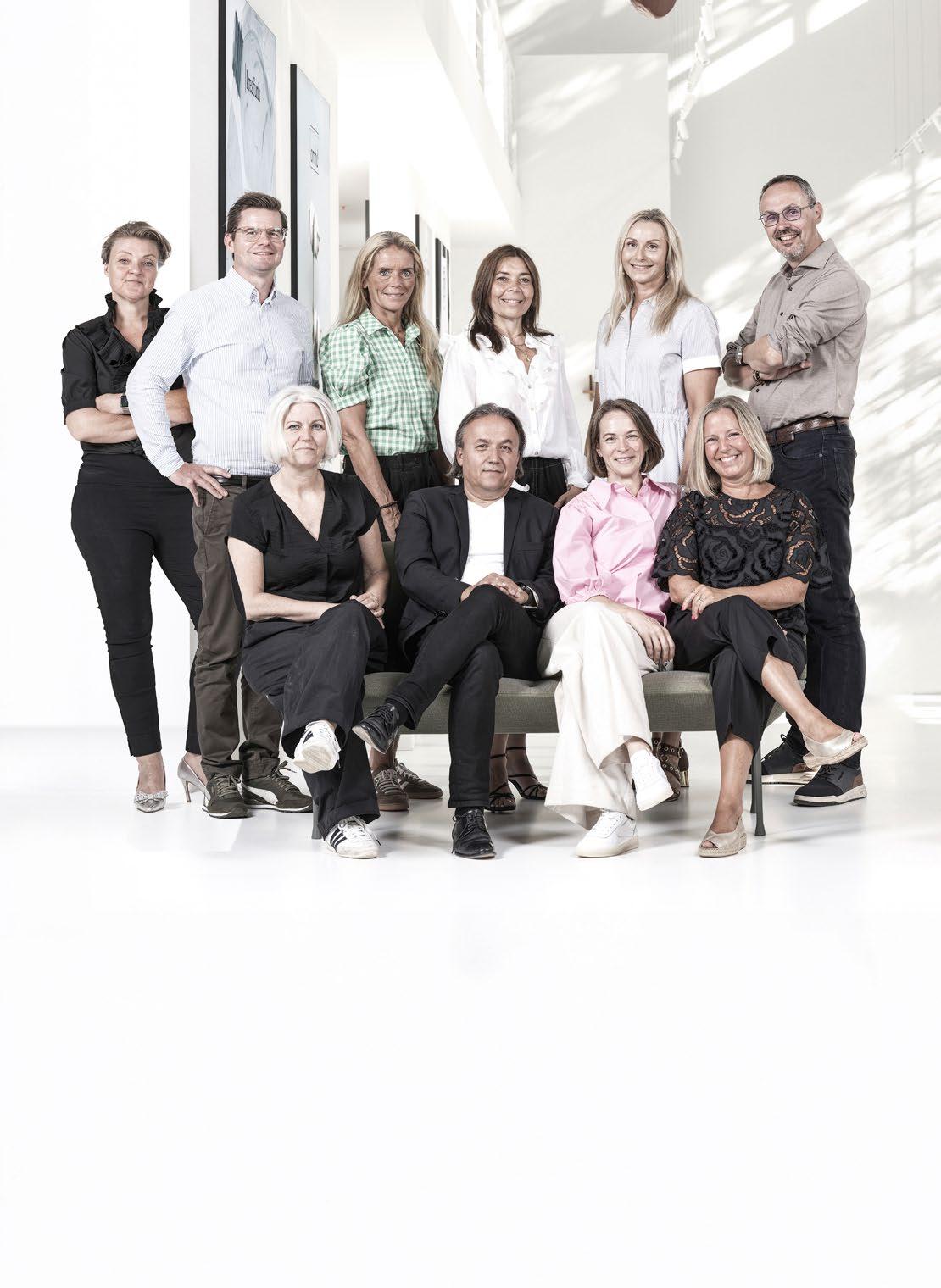
Jimmi Öberg Chief Financial Officer (CFO)
Thomas Grane Chief Information Officer (CIO)
Birgitte Illerup Head of Digital
Susanne Gallus Head of Sales
Cathinka Jareld Jørgensen
General Manager, GaveFabrikken Norway

Katrine Bjarkov Benthien Chief Executive Officer (CEO)
Martin Brøgger Head of Warehouse
Signe Scheel Ellemo Head of Procurement and Logistics, Europe
Bottom, from left to right
Top, from left to right
FOOTPRINT BREAKDOWN
The graphics illustrate the breakdown of our CO2 footprint across Scopes 1, 2, and 3.3. Scope 3.3 includes emissions from fuel and energyrelated activities not accounted for in Scopes 1 and 2. 2024-2025 includes electricity and gasoline from Norway.
EMISSIONS SCOPE 1 AND SCOPE 2
SCOPE 1 CATEGORIES
ESG DATA OVERVIEW — KEY FIGURES
ENVIRONMENT*
CO2 e, scope 1
CO2 e, scope 2, location-based
Energy Denmark & Sweden
Heating Denmark & Sweden
Transportation
COMMENTS
Environment*
The data is primarily based on Denmark and Sweden, with only electricity and petrol figures from Norway included.
For the Norwegian office, the location-based emissions factor is used as a proxy for market-based emissions. No guarantees of origin or other contractual instruments have been purchased for the electricity consumed in Norway, as the market for such instruments is not active in the domestic market. Norway is a net exporter of green certificates, making the market-based method impractical in this context. According to the GHG Protocol’s Scope 2 Guidance, location-based data must be used when the market-based approach is not supported locally. Furthermore, Norway's electricity production is predominantly based on renewable energy, particularly hydropower, resulting in very low emissions.
Since last year, Scope 1 emissions have decreased by approximately 75%, primarily as a result of transitioning 8 out of 10 company cars from fossil fuels to electric vehicles.
Scope 2 emissions have slightly decreased due to the phase-out of gas heating and the installation of heat pumps in Hedehusene. Electricity use has increased as a result, though the overall carbon intensity has been reduced due to the lower emissions factor of electricity compared to natural gas.
Waste**
The data follows GaveFabrikken's annual reporting period from May 1st to April 30th. However, the data regarding waste has been reported according to the calendar year.
Overall, we see a slight increase in total waste. The use of cardboard increased, as a larger share of products in 2024 were delivered in cardboard boxes. Additionally, increased efforts to separate clear plastic from general waste led to a rise in the amount of plastic film sorted for recycling.
Plastic Packaging includes both plastic and plastic film. In 2023, these were reported separately and the figures have been adjusted retroactively.
The amount of small electronic waste also increased, partly due to the receipt of more products containing electronics, such as air fryers.
In 2025, we will continue to focus on reusing cardboard for packaging, enhancing plastic film sorting, and ensuring proper waste fractioning at all locations.
Social***
All social data covers Denmark, Sweden and Norway
Unlike in previous years, FTE figures now also include Norway.
Sick leave for 2024/25 includes data from Norway, whereas data from previous years is not available, as it was not provided.
The increase in sick leave per FTE can be attributed to the inclusion of Norway, as well as a few cases of long-term sick leave in both Denmark and Norway.
Governance****
In September 2024, when the Danish private equity fund Capidea acquired a majority stake in GaveFabrikken, a new board of directors was established. In April 2025, Katrine Bjarkov Benthien was appointed CEO, succeeding Torben Yde, who had served as CEO since 2016 and has now retired.
Katrine Bjarkov Benthien, CEO Chief Executive Officer of the company since April 1, 2025
Nikolai Kiim, Founder and Member of the Board Board member since September 5, 2024
Henrik Wilsbech Lottrup, Member of the Board Board member since September 5, 2024
John Thomas, Chairman of the Board Chairman since September 5, 2024
Henrik Normann, Vice Chairman of the Board Vice Chairman since September 5, 2024
Louise In Birk Delfs, Member of the Board Board member since September 5, 2024
Heidi Pernille Behrens, Member of the Board since May 5, 2025
ACCOUNTING PRINCIPLES
ENVIRONMENT
Description
◦ The climate calculations are made according to the GHG protocol.
◦ The calculations in this report are based on the Greenhouse Gas Protocol, an internationally recognised method and the most widely used standard for CO2 calculations. The GHG Protocol categorises emissions into Scope 1 (direct emissions), Scope 2 (indirect emissions from energy), and Scope 3 (indirect emissions from the supply chain), further divided into 15 subcategories.
◦ In the calculations, methodological choices have been made: Emissions from electricity are calculated using the marked-based method, reflecting emissions defined by contractual instruments based on certificates of origin. The Radiative Forcing Index is included in the calculations.
◦ Organisationally, the report is delimited in accordance with the principles of "Operative Control."
◦ In the preparation of the report, efforts are made to adhere to the five accounting principles of the GHG Protocol: Relevance, Completeness, Consistency, Transparency, and Accuracy, ensuring a credible carbon footprint.
◦ The calculations were performed by Climaider ApS based on data shared by GaveFabrikken A/S.
Scope 1 emissions
Scope 2 emissions
Emission factors
Market-based method
CO2 equivalents (CO2e) Direct emissions resulting from GaveFabrikkens own combustion of fuels and materials. Scope 1 emissions are calculated based on the diesel consumption for company cars and the emission factor for diesel.
CO2 equivalents (CO2e) Scope 2 emissions: Indirect emissions derived from the energy used to produce electricity, district heating and heat pumps for GaveFabrikkens own use.
CO2 equivalents (CO2e) Greenhouse gases (GHG) are calculated based on the emission factors for each fuel type/energy source (diesel, electricity, district heating, heat pumps) and normalised to CO2 equivalents (CO2e).
CO2 equivalents (CO2e) In the calculations, methodological choices have been made: Emissions from electricity are calculated using the marked-based method, reflecting emissions defined by contractual instruments based on certificates of origin. The Radiative Forcing Index is included in the calculations.
Energy consumption kWh
Fuel consumption litre of diesel
Waste kg
Packaging kg
SOCIAL
Energy consumption kWh Energy consumption = ∑ (spent fuel type (t) * energy factor per fuel type) per fuel type + (spent electricity (incl. renewable energy) (MWh)*3.6) + (spent district heating/cooling incl. renewable sources of heating/cooling (GJ)).
Calculation is from The Danish Finance Association, CFA Society Denmark, Danske Revisorer, Nasdaq (publication January 2022).
The number of litres of diesel used in leased cars.
The calculations include all waste, the primary quantities of which come from packaging used to deliver gifts. All waste is sorted.
Packaging includes cartons, boxes, corrugated cardboard, tretch wrap, bubble mailers, plastic shipping bags etc.
◦ We have primarily used accounting principles recommended by the Danish Finance Association, CFA Society Denmark, Danske Revisorer, Nasdaq (publication January 2022).
Full-time workforce FTE
Gender diversity %
Gender diversity for other %
Full-time workforce = FTEs + temporary labour.
FTEs are full-time employees + compensated overtime + converted hourly workers and temporarily employed/temp workers converted into full-time equivalents.
The calculation is based on the fact that the underrepresented gender is men. We have based the calculation of gender diversity = ((Men FTEs + Men temporary workers)/ (Full-time work force)) * 100.
Gender diversity for other levels of management = ((Men managers)/ (All managers)) * 100. levels of management Includes the management team and employees in management positions with personnel and/or professional responsibility.
Accidents at work Days/FTE
Sickness absence Days/FTE
GOVERNANCE
Work-related accidents are reported as the number of lost working days due to accidents per full-time equivalent (FTE). The indicator “Days/FTE” is calculated by dividing the total number of lost working days by the number of FTEs in the reporting period.
Sickness absence = (Number of sick days for all own FTEs during the period)/(Total FTEs). Number of full days that all own employees are sick and therefore not at work compared to the total number of FTEs.
◦ We have primarily used accounting principles recommended by the Danish Finance Association, CFA Society Denmark, Danske Revisorer, Nasdaq (publication January 2022).
Gender Diversity on %
As women are the underrepresented gender on our Board of Directors, the Board's gender the Board of Directors diversity is calculated as follows: Gender diversity of the Board of Directors = ((Board members elected at the general meeting)/(All members of the Board of Directors elected at the general meeting)) * 100.
WE SUPPORT
At GaveFabrikken, we are committed to supporting sustainable development that benefits nature, society, and people. Since day one, we’ve taken part in initiatives where both we and our customers can contribute to positive change.
Below, you will find some of the initiatives we supported this year – alongside many smaller charities and causes to which we’ve made additional contributions.

Mentor Child
Mentorbarn is a Danish organisation that helps children and young people in vulnerable situations build a brighter future by matching them with a volunteer friendship family. This includes those living in residential care, placed in professional foster families, or at risk of being removed from their home.

Save the Children
GaveFabrikken supports the Norwegian Redd Barna, which works for a world that respects every child’s right to survival, protection, development, and participation in line with the UN’s Convention on the Rights of the Child as well as other human rights conventions.
Swedish Red Cross
Svenska Röda Korset helps people to break isolation and offers psycho-social support. PresentBolaget, our Swedish subsidiary, supports Röda Korset in their work to make a difference for people in need.
Operation Myriad of Christmas Gifts
Since 2008, GaveFabrikken has been the main sponsor of the Danish charity initiative Operation Julegaveregn. The organisation collects donations, all of which go toward Christmas gifts for children at Danish orphanages and 24-hour care centres.
Danish Sclerosis Association
We support the Danish Sclerosis Association through Cykelnerven, a unique charity cycling event that raises funds for research and improved treatment for people living with multiple sclerosis. We are proud to contribute to this meaningful initiative.
Hospital Children
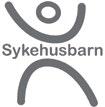
GaveFabrikken supports the Norwegian foundation Sykehusbarn, which works to ensure that children who are affected by their own or others’ serious illness have positive experiences filled with joy, smiles, and laughter during the treatment period in the hospital.
Danish appeal for funds
Danmarks Indsamling helps the most vulnerable people in the world through specific projects that support the UN’s global goals. Again, this year, GaveFabrikken supported Danmarks Indsamling to contribute to these very important projects.
Adventurous Christmas
Every year on Christmas Eve, the Danish organisation Eventyr Jul celebrates Christmas for approx. 300 vulnerable children and their parents. Together with our partners, GaveFabrikken donates Christmas gifts which the children can give to their parents for Christmas.
Team Rynkeby
Team Rynkeby is an international charity cycling team that rides to Paris every year to raise money for children with critical illnesses. This year, GaveFabrikken has supported the initiative, helping to make a difference for the children and their families.
ForestPlanet
We collaborate with the organisation ForestPlanet that approach reforestation like a business with strategic, long-term investments. But instead of quarterly profits, the return shows in the form of healthier ecosystems and thriving communities.
PLANTING TREES FOR A GREENER FUTURE
ForestPlanet is a nonprofit organisation committed to large-scale, community-driven reforestation in regions where trees have the most positive ecological and social impact. Their mission is simple yet powerful: to plant as many trees as possible, as fast as possible, in the most beneficial locations possible.
GaveFabrikken is proud to support ForestPlanet in their efforts to combat climate change and restore ecosystems. With every tree planted, ForestPlanet helps to improve soil quality, secure clean water sources, and increase biodiversity. But their impact extends beyond the environment by involving local communities in planting and maintenance, they also create jobs and support economic development.
In 2024, ForestPlanet surpassed a major milestone by planting over 6 million trees in regions such as Tanzania, Madagascar, and Nepal. These trees are primarily

fast-growing agroforestry species, which not only capture carbon but also support sustainable farming practices. Many of the tree-planting sites are strategically located near farmlands, offering additional shade, improving yields, and protecting crops from erosion.
GAVEFABRIKKEN’S ROLE
At GaveFabrikken we work actively to balance commercial activity with responsible practices. Our partnership with ForestPlanet is part of our effort to engage in meaningful, nature-based initiatives.
As part of our Gifts with Care initiative, we offer gifts that support tree planting initiatives. Customers can plant trees in the name of their employees and thereby contribute to reforestation.
We are proud to partner with ForestPlanet and to support changes one tree at a time.
We hope you have enjoyed reading our Communication on Progress. If you have any comments or questions, we are happy to receive these.
PUBLISHED BY GaveFabrikken A/S
CONTACT PERSON Mette Høeberg Sørensen
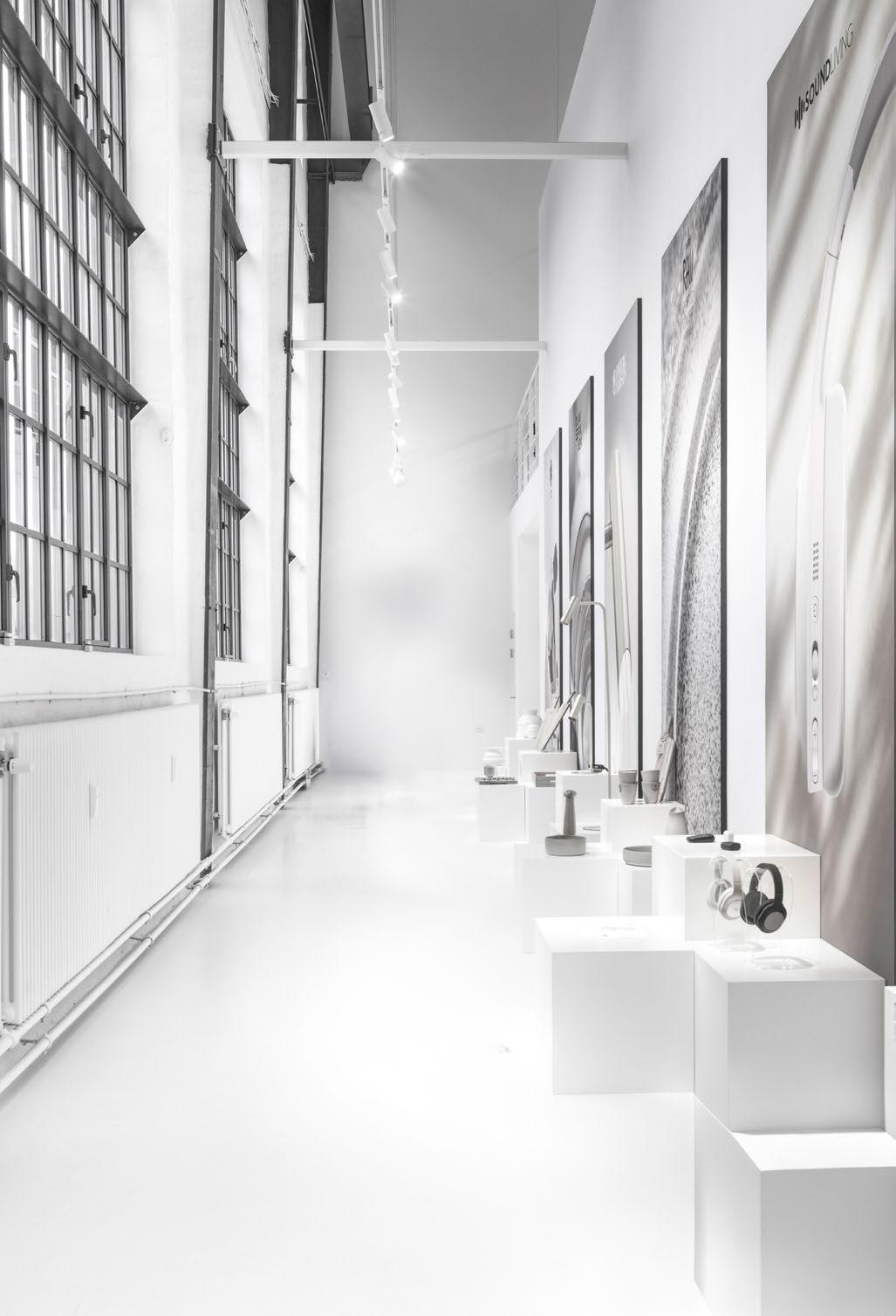
DENMARK
info@gavefabrikken.dk
+45 70 70 20 27 gavefabrikken.dk
NORWAY
info@gavefabrikken.no
+47 23 90 50 53 gavefabrikken.no
SWEDEN
info@presentbolaget.se
+46 0771-600005 presentbolaget.se
